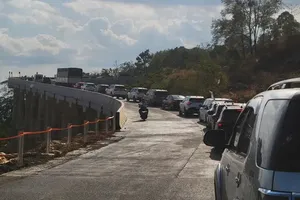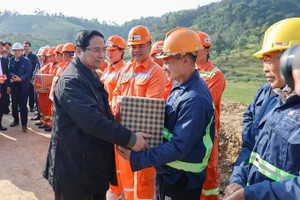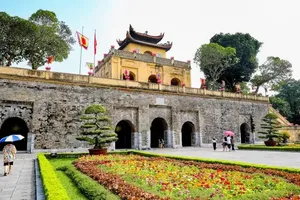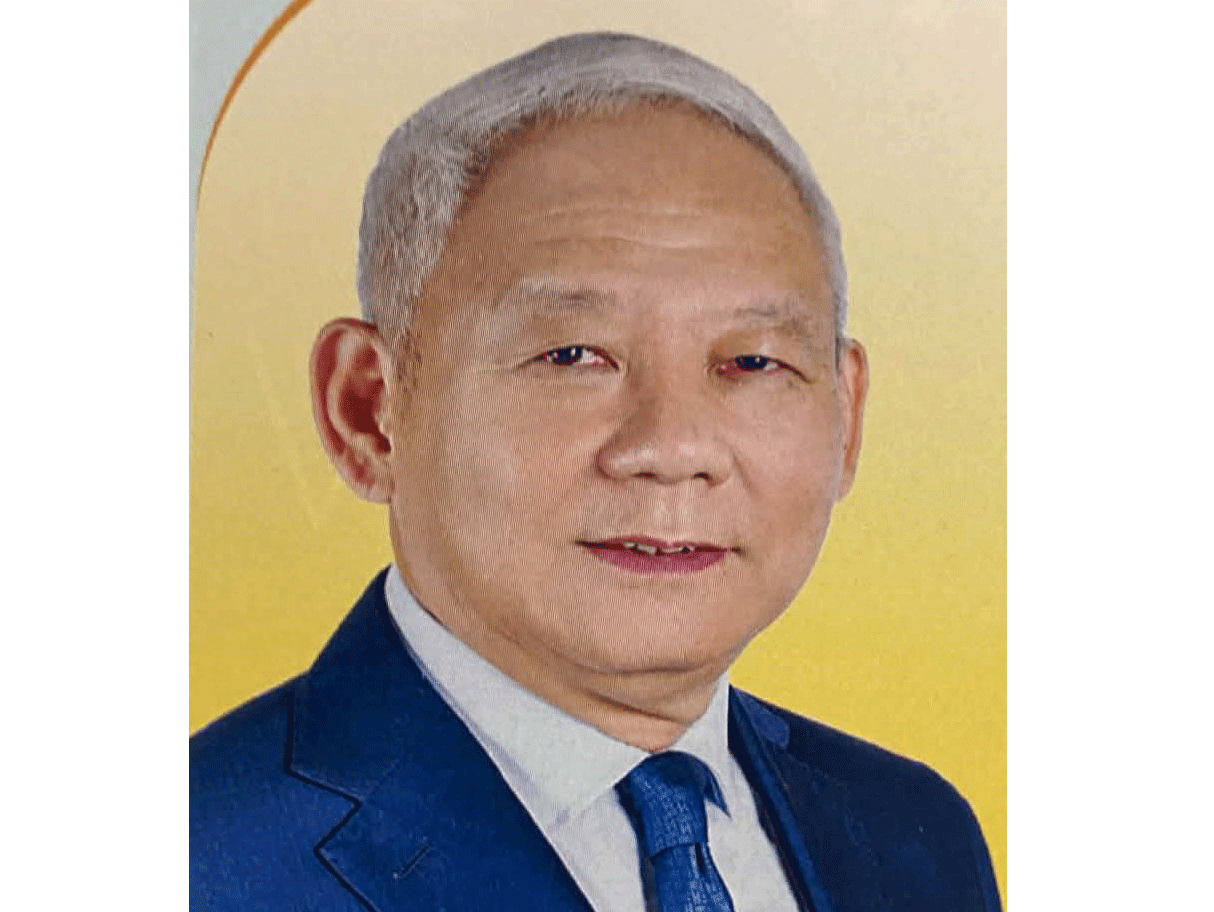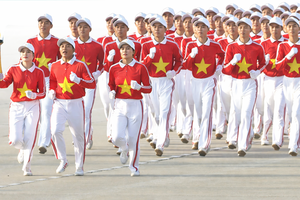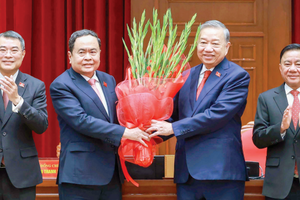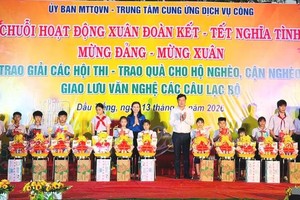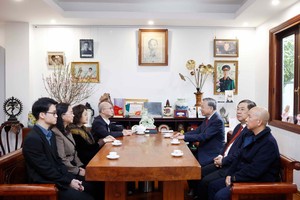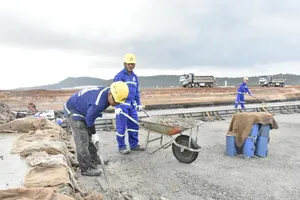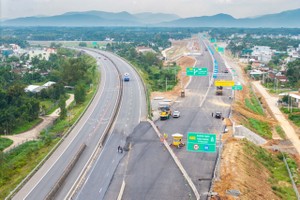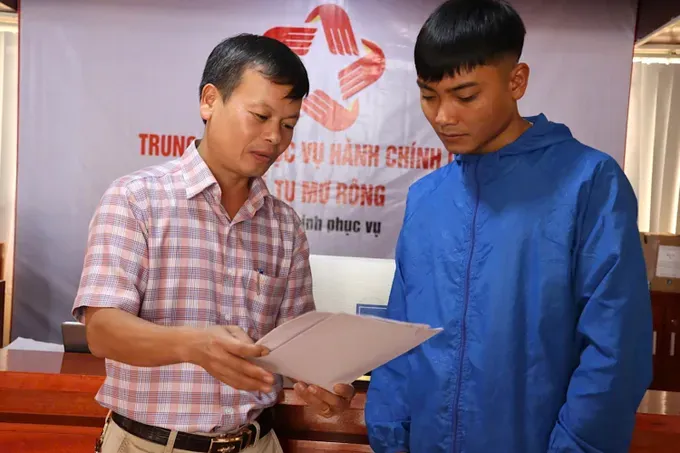
Hanoi and Da Nang City: Professional, attentive service
In Hanoi yesterday, the new, modern Public Administrative Service Center for Dong Da Ward was bustling from early morning. Nguyen Xuan Sinh, a local resident, shared that despite his initial confusion due to the administrative changes, he completed his land document certification in just 30 minutes. “The officials here provided detailed instructions; they were fast and friendly”, he said.
The Ward’s Party Secretary Nguyen Ngoc Viet noted that while the center has only five official staff, they mobilized additional personnel to ensure smooth processing and prevent long wait times.
At Bach Mai Ward, the Public Administrative Service Center was well-organized, with clear functional areas for document reception, processing, and support, ensuring a smooth workflow despite the large crowds.
In Hoan Kiem Ward, wait times were also short despite a large crowd. The leadership of Hoan Kiem Ward informed that the locality has strengthened the application of IT and digital transformation, along with a well-trained team of officials and civil servants, so people quickly had their administrative procedures processed.
“Even though this is a new ward, the officials are very professional”, said resident Nguyen Thi Thanh from Hang Gai Street. “There were many people, but I didn’t have to wait long.”
The first day of the new two-tier local government model in Hanoi left a strong positive impression, heralding a more transparent, efficient, and people-centric public administration.
In Da Nang City, the three new communes of Hoa Vang, Hoa Tien, and Ba Na have deployed Artificial Intelligence (AI) to assist the public. By scanning a QR code, citizens can now use text or voice commands to ask an AI assistant for detailed guidance on administrative procedures, contributing to shortening processing time.
“We are gradually training the AI with real data to aid in such essential areas as land procedures, insurance, household registration, social policies. It had been put into trial operation so that people could get used to it in time”, said Hoa Vang Commune Party Secretary Bui Hong Trung. “This tool becomes more effective as people interact with it and give feedback, helping the system to continuously improve.”
Highland, remote areas: Quick, convenient procedures
In the morning of July 1, Tu Mo Rong Commune, Quang Ngai Province officially operated the new commune-level government. The commune has more than 1,300 households, with the Xo Dang ethnic group accounting for about 95 percent.
From the morning, a large number of people came to the headquarters of the Tu Mo Rong Commune Public Administration Service Center to carry out procedures for notarizing documents, degrees, and resolving issues related to the fields of culture, society, and economy.
The spacious facility of the Center, equipped with a queue management system, provided an orderly and efficient experience. “An official proactively approached me to help”, recounted resident A Dinh Phuoc from Tu Mo Rong Commune, who came to have his job application documents notarized. “He warmly guided me to the right counter and helped me organize my papers quickly.”
In Dau Tieng Commune (formerly in Binh Duong Province), an area now part of the expanded HCMC but located 83km from the city center, 15 officials were hard at work processing documents smoothly, supported by four Ho Chi Minh Communist Youth Union volunteers who assisted elderly citizens having trouble with digital procedures.
In Dat Mui Commune of Ca Mau Province, the nation’s southernmost commune, Chairman Cao Van Phu reported that all administrative services ran smoothly on the first day thanks to the serious and industrious working spirit of all civil servants and officials, earning positive feedback from residents.
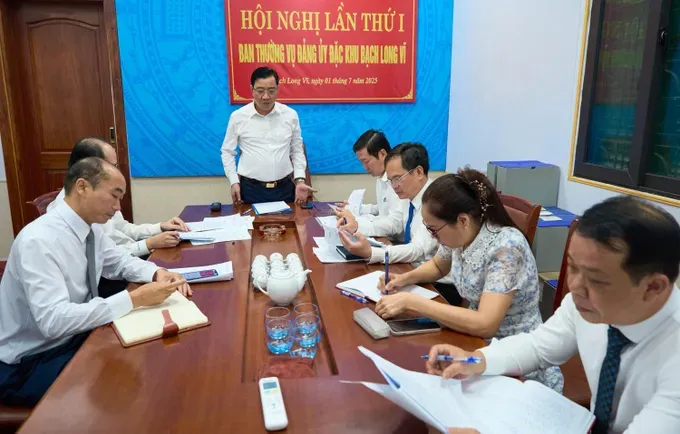
New special administrative zones in smooth operation
The administrative restructuring also sees the establishment of new special administrative zones. As part of a hypothetical merger scenario, the new An Giang Province now includes three such special zones from the former Kien Giang Province, namely Phu Quoc, Tho Chau, and Kien Hai.
Kien Hai Special Zone is established on the basis of merging the island communes of An Son, Nam Du, Lai Son, and Hon Tre of the old Kien Hai District. Tho Chau Special Zone is established on the original state of Tho Chau Island Commune. Phu Quoc Special Zone is established on the basis of merging the entire natural area and population of Duong Dong and An Thoi wards and the communes of Duong To, Ham Ninh, Cua Duong, Cua Can, Ganh Dau, Bai Thom; in other words, the entire area of the former Phu Quoc City.
In Phu Quoc Special Zone yesterday, residents were enthusiastic. “I heard the land procedures would be better, so I came early”, said Ngo Thi Nham from Duong Bao Hamlet. “The officials were warm, enthusiastic, and guided me in every detail to fill in the information accurately and received the documents quickly. I am really very satisfied and hope that in the coming days, this will always be maintained, ensuring the rights of the people.”
Chairman Tran Minh Khoa of the Phu Quoc Special Zone People’s Committee announced plans to apply digitalization and technology to streamline management and reduce procedural time for residents and investors.
In Hai Phong City, the island districts of Bach Long Vi and Cat Hai have officially become special zones with new policies to spur socio-economic development.
Cat Hai Special Zone is established on the basis of transferring the entire state of Cat Hai District (10 communes, 2 towns), with a natural area of nearly 287km2, and a population of more than 71,000 people. Similarly, Bach Long Vi Special Zone is established on the basis of transferring the entire state of Bach Long Vi Island District with a natural area of more than 3km2, and a population of nearly 700 people. The working headquarters of Bach Long Vi Special Zone is located at the former headquarters of Bach Long Vi District.
In the morning of July 1, the Party Committee of Bach Long Vi Special Zone held the first session of the Executive Committee, the Standing Committee of the Party Committee of Bach Long Vi Special Zone. With the characteristic of a small area and no commune-level administrative units, the conversion of the model into a special zone is quite favorable.
Currently, the electricity – road – school – station system is being invested in to be more spacious, social and cultural institutions are being completed and upgraded, contributing to improving the material and spiritual life of the people.
